They were messengers, spies and sentinels. They led cavalry charges, carried supplies to the front, and died by the millions during World War I.
Horses, mules, dogs, pigeons, even a baboon, all were a vital — and for decades overlooked — part of the Allied war machine.
Click to Gallery
They were messengers, spies and sentinels. They led cavalry charges, carried supplies to the front, and died by the millions during World War I.
Here's a look at how four-legged and winged warriors contributed.
World War I marked the start of industrial warfare, with tanks, trucks, aircraft and machine guns in action. But the growing sophistication of the instruments of death couldn't match the dog tasked with finding the wounded, the horses and mules hauling munitions and food or the pigeons serving as telecommunications operators or even eyes, carrying "pigeongrams" or tiny cameras to record German positions.
In France, as in Britain and elsewhere, horses and mules were requisitioned.
Cher Ami, or Dear Friend, the carrier pigeon who wouldn't quit, lived up to her name, saving the lives of 194 American troops of the "Lost Battalion" of the 77th Infantry Division, isolated behind enemy lines during the 1918 Meuse-Argonne offensive in eastern France.
Researchers have been hard-pressed to find official accounts of the services rendered by animals. Today, they are emerging as unsung heroes of the Great War. France recently decided to recognize their role in war. And in 2004, Britain installed a huge memorial to the vital contributions of animals on the edge of London's Hyde Park.
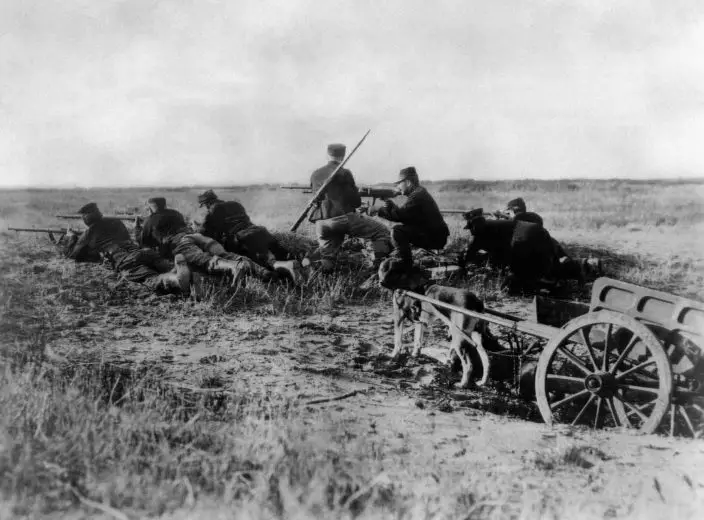
FILE - A Belgian machine gun detachment aims near Haelen, with a dog pulling a cart in August 1914. The Belgians used dogs to draw these guns and ammunitions. They were messengers, spies, sentinels and the heavy haulers of World War I, carrying supplies, munitions and food and leading cavalry charges. The horses, mules, dogs and pigeons were a vital part of the Allied war machine, saving countless lives _ and dying by the millions. (AP Photo, File)
Here's a look at how four-legged and winged warriors contributed.
WHAT THEY DID
An estimated 10 million horses and mules, 100,000 dogs and 200,000 pigeons were enrolled in the war effort, according to Eric Baratay, a French historian specializing in the response of animals to the chaos, fear and smells of death in the mission that man thrust upon them.
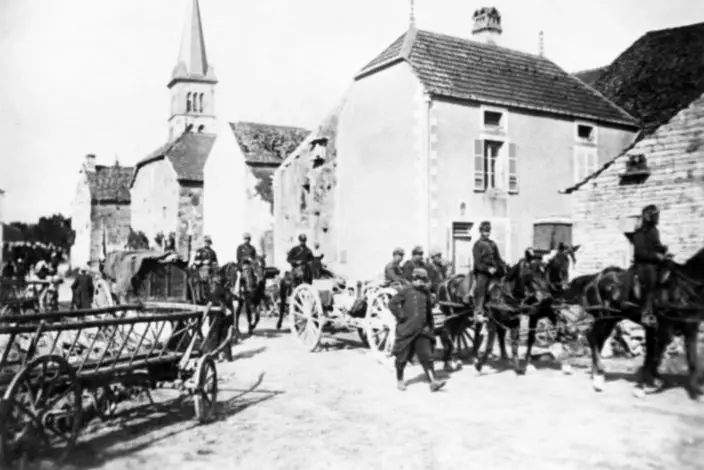
FILE - French cavalry marching through northern France, after driving the Germans back in an undated photo. They were messengers, spies, sentinels and the heavy haulers of World War I, carrying supplies, munitions and food and leading cavalry charges. The horses, mules, dogs and pigeons were a vital part of the Allied war machine, saving countless lives _ and dying by the millions. (AP Photo, File)
World War I marked the start of industrial warfare, with tanks, trucks, aircraft and machine guns in action. But the growing sophistication of the instruments of death couldn't match the dog tasked with finding the wounded, the horses and mules hauling munitions and food or the pigeons serving as telecommunications operators or even eyes, carrying "pigeongrams" or tiny cameras to record German positions.
"They were quasi-combatants," said Serge Barcellini, comptroller general of the Armed Forces and head of Le Souvenir Francais — The French Memory — in a recent speech devoted to the role played by beasts of war.
Indeed, gas masks were fitted to the muzzles of four-legged warriors braving noxious battlefield fumes.
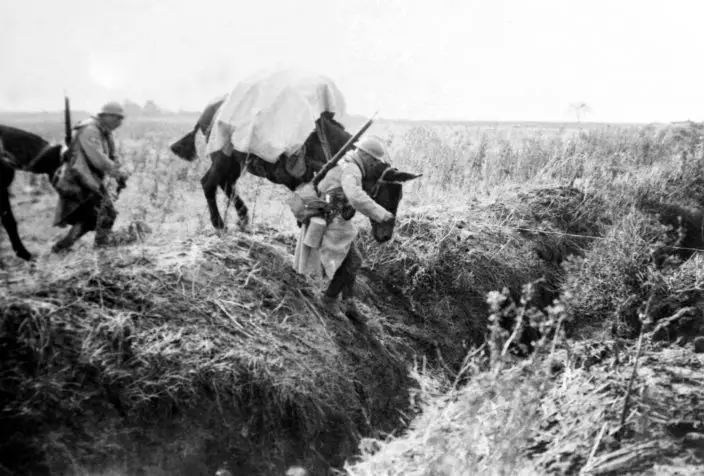
FILE - This undated file photo shows machine gunners with mules crossing a trench in France during WWI. They were messengers, spies, sentinels and the heavy haulers of World War I, carrying supplies, munitions and food and leading cavalry charges. The horses, mules, dogs and pigeons were a vital part of the Allied war machine, saving countless lives _ and dying by the millions. (AP Photo, File)
In France, as in Britain and elsewhere, horses and mules were requisitioned.
One typical sign posted in southern Paris ordered citizens to present their steeds and mules to the Requisition Committee by Nov. 14, 1914, or risk "prosecution by the military authority." It was becoming clear there would be no quick end to the war that ground on for four more years.
FEATHERED HEROES
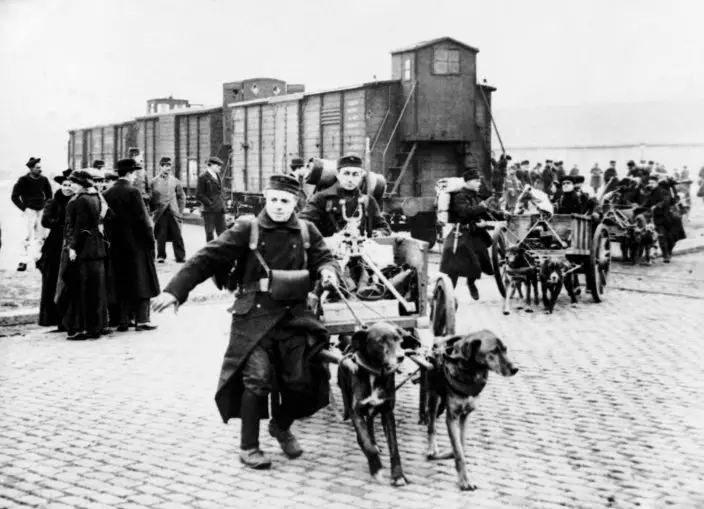
FILE - In this undated WWI file photo, soldiers move toward the front with their machine guns and ammunition pulled by dogs in Belgium. They were messengers, spies, sentinels and the heavy haulers of World War I, carrying supplies, munitions and food and leading cavalry charges. The horses, mules, dogs and pigeons were a vital part of the Allied war machine, saving countless lives _ and dying by the millions. (AP Photo, File)
Cher Ami, or Dear Friend, the carrier pigeon who wouldn't quit, lived up to her name, saving the lives of 194 American troops of the "Lost Battalion" of the 77th Infantry Division, isolated behind enemy lines during the 1918 Meuse-Argonne offensive in eastern France.
About 550 men had held their ground against a far larger German force for days before coming under fire from American troops unaware the trapped soldiers weren't the enemy.
On Oct. 4, Maj. Charles Whittlesey sent Cher Ami into the skies with a final message giving the U.S. battalion's location, followed by a plea: "For heaven's sake stop it."
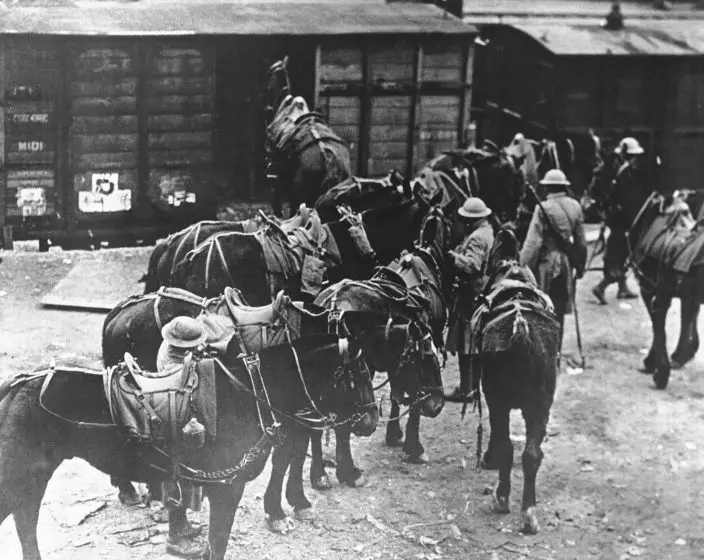
FILE - In this March 7, 1918 file photo, men of U.S. Battery E, 5th Field Artillery Battalion, 1st Infantry Division, load horses onto freight cars in Toul, eastern France, en route to the French front. They were messengers, spies, sentinels and the heavy haulers of World War I, carrying supplies, munitions and food and leading cavalry charges. The horses, mules, dogs and pigeons were a vital part of the Allied war machine, saving countless lives _ and dying by the millions. (AP Photo, File)
Cher Ami lost an eye and a leg from German gunfire, but kept flying, around 25 miles (40 kilometers) in about a half-hour, according to the United States World War One Centennial Commission. Survivors of the "Lost Battalion" returned to American lines four days later.
Another carrier pigeon named Vaillant, assigned to the French military, also performed extraordinary feats during the war.
On June 4, 1916, he was released into the sky with the desperate message, "He's my last pigeon."
French Commander Sylvain Eugene Raynal, encircled by Germans at the Fort de Vaux near Verdun, was counting on Vaillant to save his men.
The feisty bird flew through toxic gas and smoke, reaching the Verdun pigeon loft choked by fumes. With no help arriving despite Vaillant's courageous effort, Raynal and his men surrendered three days later.
Both Cher Ami and Vaillant were awarded France's Croix de Guerre, or War Cross.
ROUND 'EM UP
Horses are ancient warriors, but most of those conscripted during World War I weren't war-ready. They died by the millions, from disease, exhaustion and enemy fire, forcing the French and British armies to turn to America to renew their supply. A veritable industry developed with more than half a million horses and mules shipped by boat to Europe by fall 1917, according to the American Battle Monuments Commission.
So important was the commerce that the Santa Fe Railroad named a station Drage, after British Lt. Col. F.B. Drage, the commander of the British Remount Commission in Lathrop, Missouri, a major stockyard for the future beasts of war.
"So the war business in horses and mules is good," read an article in the December 1915 issue of The Santa Fe Magazine, for employees of the railway system. Good for the farmer, contractor, supplier and railroads, it said, but "not good for the animals."
SERVICE BY EXOTICS
Among the more exotic animals called into service was a baboon named Jackie, who served with the 1st South African Infantry Brigade in then British-occupied Egypt and later in the trenches in France and Belgium. His acute hearing and keen eyesight helped warn soldiers of enemy movement or possible attacks when he would screech and tug on their clothing.
Jackie was wounded in Flanders Fields when the South African brigade came under heavy shelling in April 1918 and his leg had to be amputated.
Lt. Col. R.N. Woodsend, of Britain's Royal Medical Corps, described that procedure: "He lapped up the chloroform as if it had been whiskey, and was well under in a remarkably short time. It was a simple matter to amputate the leg with scissors."
DOGS OF WAR
Man's best friend helped soldiers survive. Dogs served, firstly, as spotters of the wounded, learning to identify ally from enemy. They also served as sentinels, messengers, transporters and chasers of rats — the bane of the trenches along with lice and fleas. The French military created a service devoted to dogs of war in December 1915.
Less official, but crucial to soldiers' morale, was the role of dogs and other creatures in the trenches, and as mascots. Stray dogs running from fighting were adopted as companions along with other animals, including a Royal Air Force fox mascot adopted by British pilots.
These dogs and other mascots helped soldiers "think of life ... and the life they hoped to find again," said Baratay, the French historian, in a speech last month in Paris.
PARIS (AP) — French President Emmanuel Macron warned Thursday that Europe could “die” if it fails to build its own robust defense as Russia’s war in Ukraine rages on, or if it fails to undertake major trade and economic reforms to compete with China and the U.S.
Macron urged Europeans to become more ambitious in a fast-changing world to face the challenges of war, fierce trade competition, energy scarcity, climate change and increasing authoritarianism.
In a nearly two-hour speech at Sorbonne University in Paris, Macron said that the continent is divided and “too slow and lacks ambition” at a time when the 27-member European Union needs to become a superpower, defend its own borders and speak with one voice if it wants to survive and thrive.
“Our Europe today is mortal,” Macron said. “It can die and that depends solely on our choices,” he added. He called on people to make those choices now because, “it’s today that Europe is between war and peace.”
Russia's full-scale invasion of Ukraine, now in its third year, is an existential threat and Europe isn't armed enough to defend itself when “confronted by a power like Russia that has no inhibitions, no limits,” Macron said.
‘Our ability to ensure our security is at stake," Macron said. “Russia mustn’t be allowed to win.”
Europe now has the “good fortune” of having the Biden administration’s commitment to supporting Ukraine, Macron said. But, in a year of key elections around Europe, in the U.S. and elsewhere, support may fragment or disappear entirely, he added.
“Europe must become capable of defending its interests, with its allies by our side whenever they are willing, and alone if necessary,” Macron said.
Strong armies, a European rapid intervention program and force, tanks, a missile shield and other weapons, produced in Europe, will need the support of “a joint diplomatic force that will speak with one voice and build bridges with Africa and Latin America,” the French leader said.
“Only then will Europe show that it's not a United States’ lap dog, and that it also knows how to talk to other regions of the world,” he said.
France has been a firm supporter of Ukraine in its fight against Russian aggression, and Macron has often clashed with other Western leaders as he has insisted that Europe must stand by the country at any cost. The French president alarmed European leaders by saying recently that sending Western troops into Ukraine to shore up its defenses shouldn’t be ruled out.
Referring to trade practices of China and the U.S., Macron said “the two world powers have decided not to respect the rules of global trade” by shoring up protections and subsides while Europe’s industry remains open and is stuck in overregulation.
“Let’s do the same, we are in competition,” Macron said.
“We must buy faster, we must produce more and we must buy more that is made in Europe. That is key,” Macron said.
Thursday's speech came less than two months before a pivotal European Parliament election.
Macron, an avid advocate of a united and assertive Europe, also rallied support for his centrist Renaissance party before the June 6-9 vote as far-right parties lead the moderate coalitions in the polls. He called for safeguarding democratic values as the “authoritarian model” was becoming “more popular” across the continent.
The war in Ukraine and immigration are top priorities for European Union voters, according to polls. Far-right parties have gained support by criticizing Macron’s government policies on both issues. Macron acknowledged divisions on immigration policies, including on asylum and deportation rules for those who have arrived to Europe illegally.
He emphasized the need for an effective response and Europe-wide coordination for curbing illegal immigration, closer cooperation with immigrants' countries of origin and a unified, relentless fight against human traffickers.
Macron criticized the idea of striking an agreement, as Britain as done, with countries in Africa and elsewhere to transfer immigrants there.
“This is a betrayal of our values that ultimately leads us to dependency on other counties,” Macron said.
The British government earlier this week approved a law allowing the deportation of some migrants who enter the country illegally to Rwanda.
Macron lost his majority in France’s most influential house of parliament, the National Assembly, after the 2022 election to the far-left coalition and the far-right National Rally party.
The social situation in France remains tense as Paris prepares to host the Olympic Games this summer, amid protests from teachers and police officers, and farmer demonstrations in recent weeks. The protests follow huge rallies last year against Macron’s ultimately successful proposal to increase the retirement age from 62 to 64.
Barbara Surk reported from Nice, France. Lorne Cook contributed to this report from Brussels.
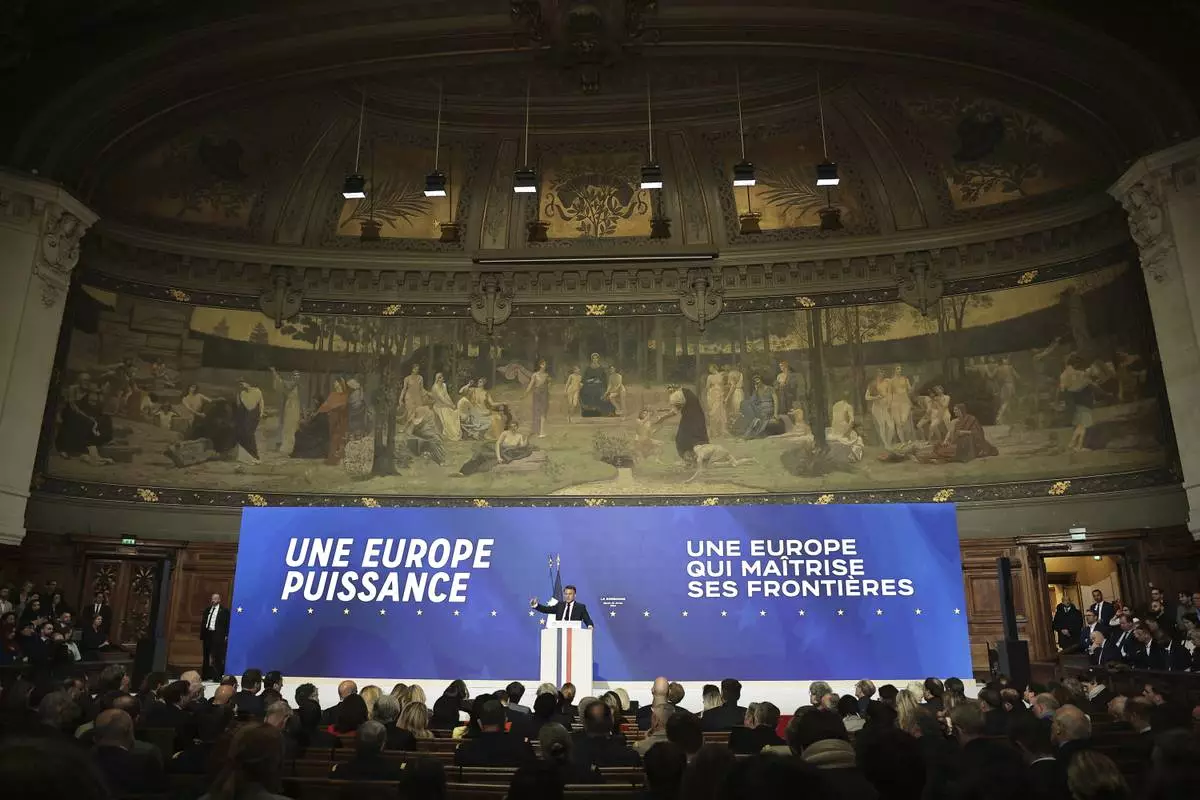
French President Emmanuel Macron delivers a speech on Europe in the amphitheater of the Sorbonne University, Thursday, April 25 in Paris. 2024. French President Emmanuel Macron will outline his vision for Europe as a more assertive global power at the backdrop of war in Ukraine, security, and economic challenges in a speech ahead of pivotal election for the European Parliament in June. (Christophe Petit Tesson, Pool via AP)
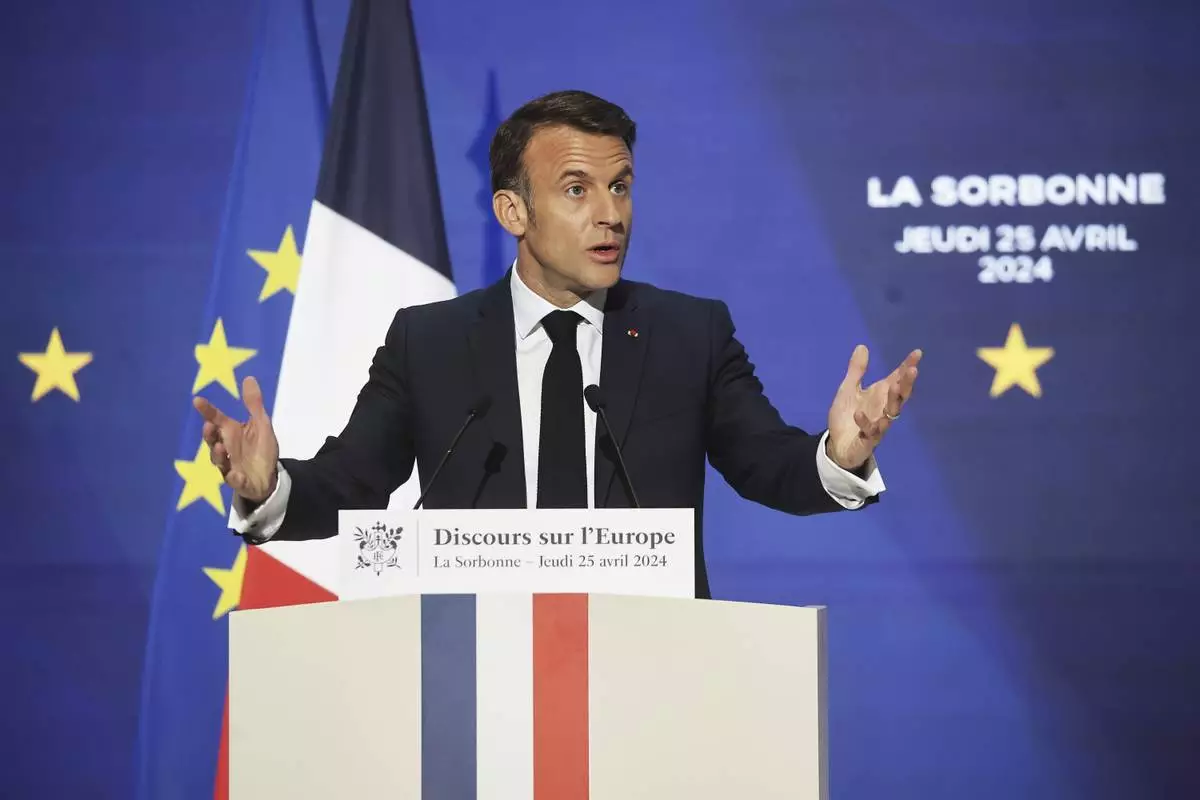
French President Emmanuel Macron delivers a speech on Europe in the amphitheater of the Sorbonne University, Thursday, April 25 in Paris. 2024. French President Emmanuel Macron will outline his vision for Europe as a more assertive global power at the backdrop of war in Ukraine, security, and economic challenges in a speech ahead of pivotal election for the European Parliament in June. (Christophe Petit Tesson, Pool via AP)
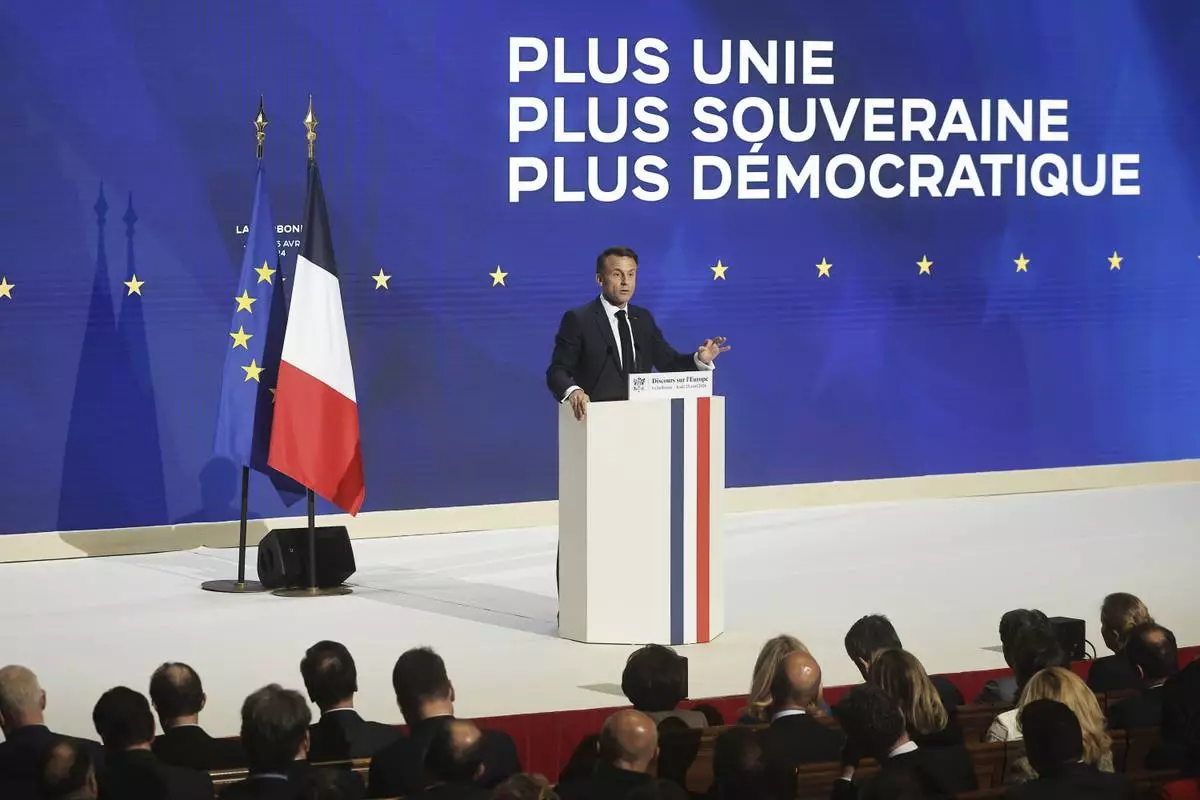
French President Emmanuel Macron delivers a speech on Europe in the amphitheater of the Sorbonne University, Thursday, April 25 in Paris. 2024. French President Emmanuel Macron will outline his vision for Europe as a more assertive global power at the backdrop of war in Ukraine, security, and economic challenges in a speech ahead of pivotal election for the European Parliament in June. (Christophe Petit Tesson, Pool via AP)
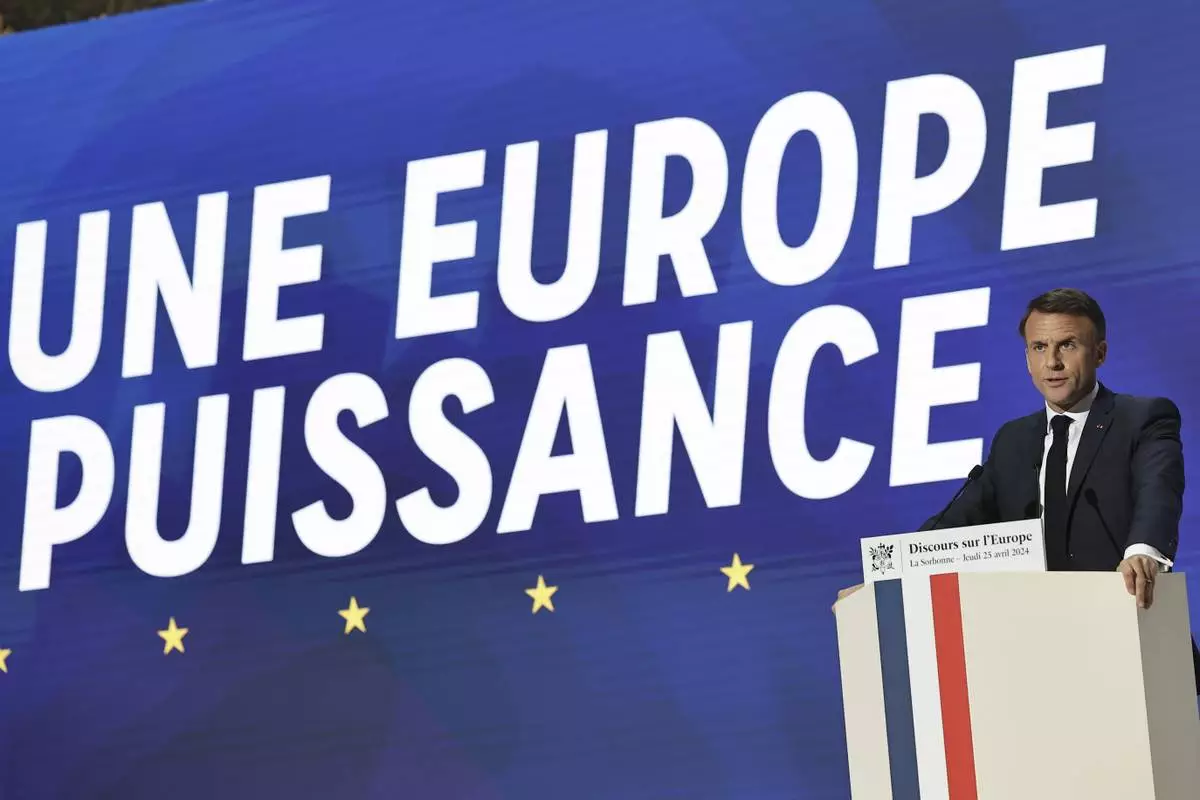
French President Emmanuel Macron delivers a speech on Europe in the amphitheater of the Sorbonne University, Thursday, April 25 in Paris. 2024. French President Emmanuel Macron will outline his vision for Europe as a more assertive global power at the backdrop of war in Ukraine, security, and economic challenges in a speech ahead of pivotal election for the European Parliament in June. (Christophe Petit Tesson, Pool via AP)
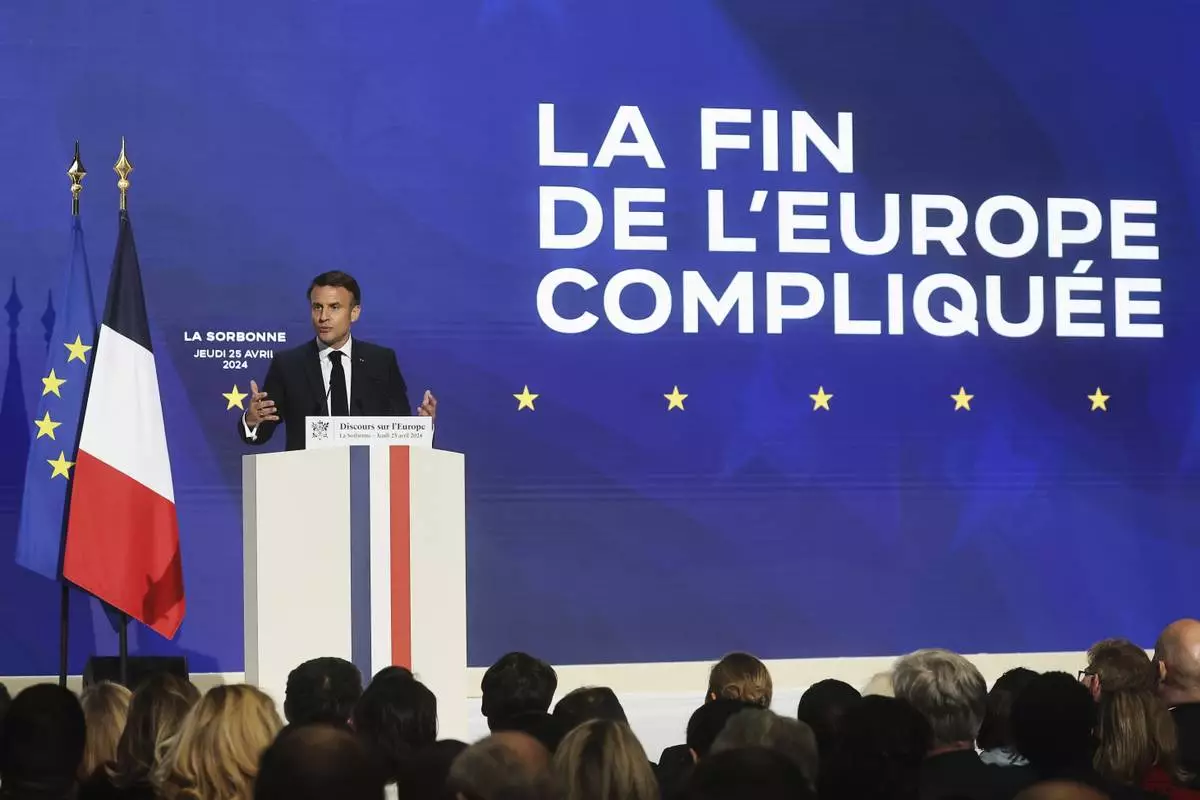
French President Emmanuel Macron delivers a speech on Europe in the amphitheater of the Sorbonne University, Thursday, April 25 in Paris. 2024. French President Emmanuel Macron will outline his vision for Europe as a more assertive global power at the backdrop of war in Ukraine, security, and economic challenges in a speech ahead of pivotal election for the European Parliament in June. (Christophe Petit Tesson, Pool via AP)
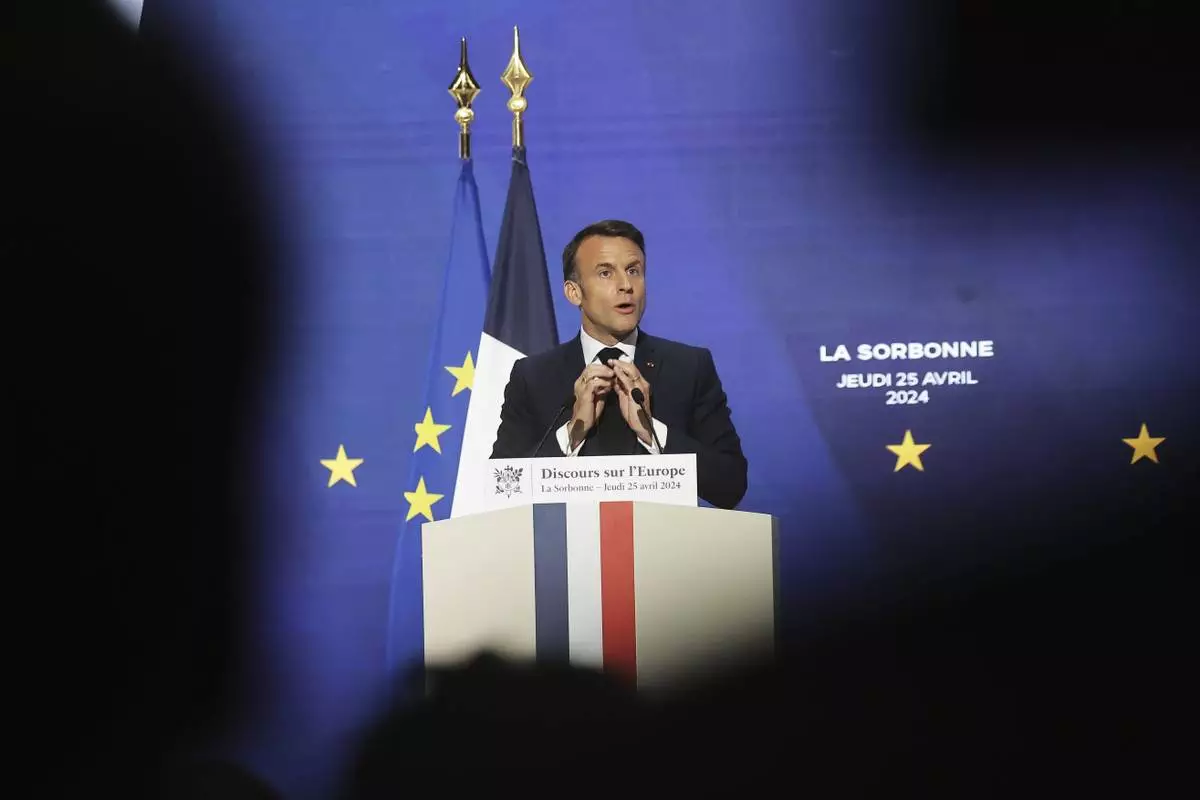
French President Emmanuel Macron delivers a speech on Europe in the amphitheater of the Sorbonne University, Thursday, April 25 in Paris. 2024. French President Emmanuel Macron will outline his vision for Europe as a more assertive global power at the backdrop of war in Ukraine, security, and economic challenges in a speech ahead of pivotal election for the European Parliament in June. (Christophe Petit Tesson, Pool via AP)
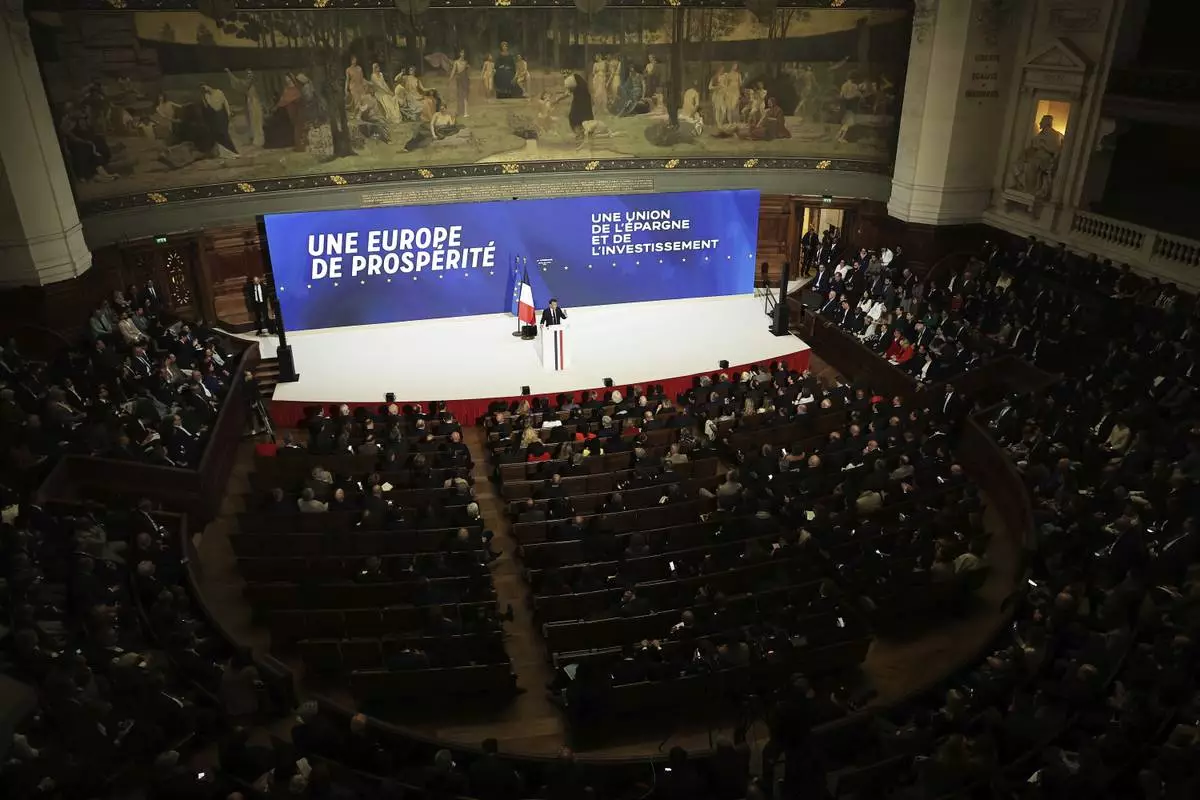
French President Emmanuel Macron delivers a speech on Europe in the amphitheater of the Sorbonne University, Thursday, April 25 in Paris. 2024. French President Emmanuel Macron will outline his vision for Europe as a more assertive global power at the backdrop of war in Ukraine, security, and economic challenges in a speech ahead of pivotal election for the European Parliament in June. (Christophe Petit Tesson, Pool via AP)
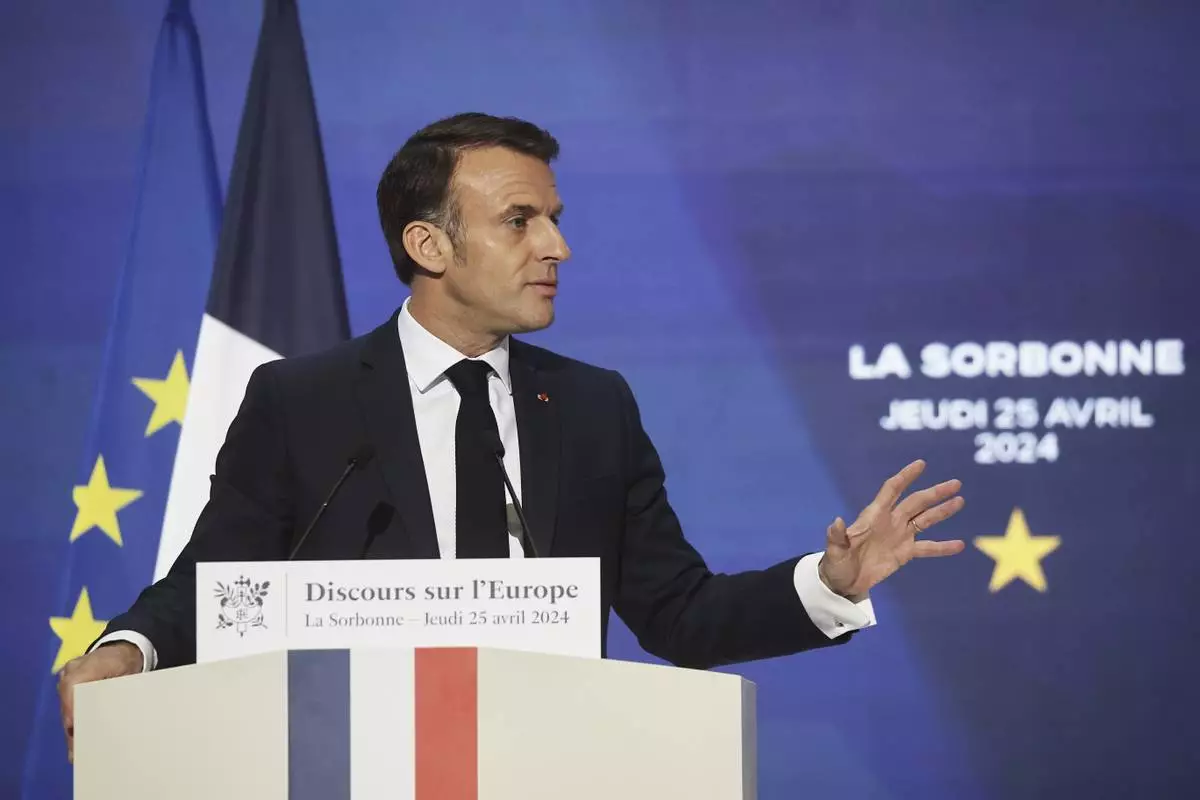
French President Emmanuel Macron delivers a speech on Europe in the amphitheater of the Sorbonne University, Thursday, April 25 in Paris. 2024. French President Emmanuel Macron will outline his vision for Europe as a more assertive global power at the backdrop of war in Ukraine, security, and economic challenges in a speech ahead of pivotal election for the European Parliament in June. (Christophe Petit Tesson, Pool via AP)
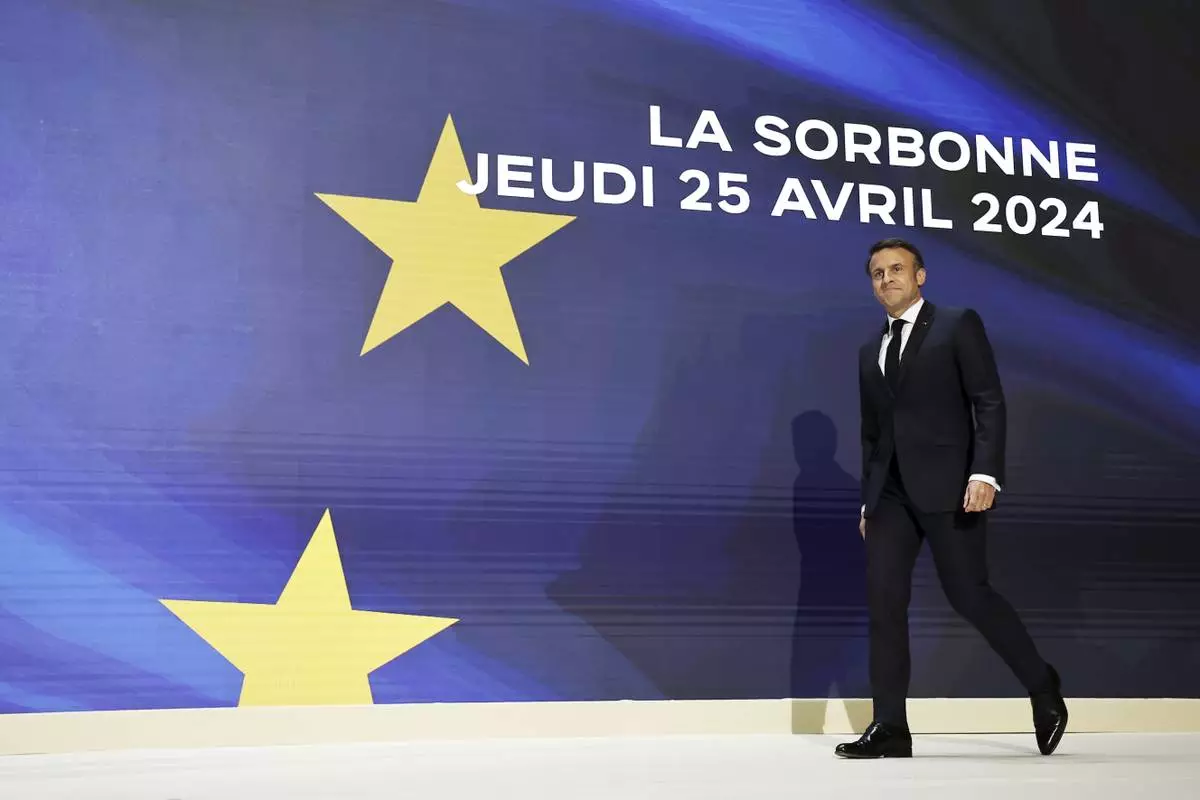
French President Emmanuel Macron arrives to deliver a speech on Europe in the amphitheater of the Sorbonne University, Thursday, April 25 in Paris. 2024. French President Emmanuel Macron will outline his vision for Europe as a more assertive global power at the backdrop of war in Ukraine, security, and economic challenges in a speech ahead of pivotal election for the European Parliament in June. (Christophe Petit Tesson, Pool via AP)
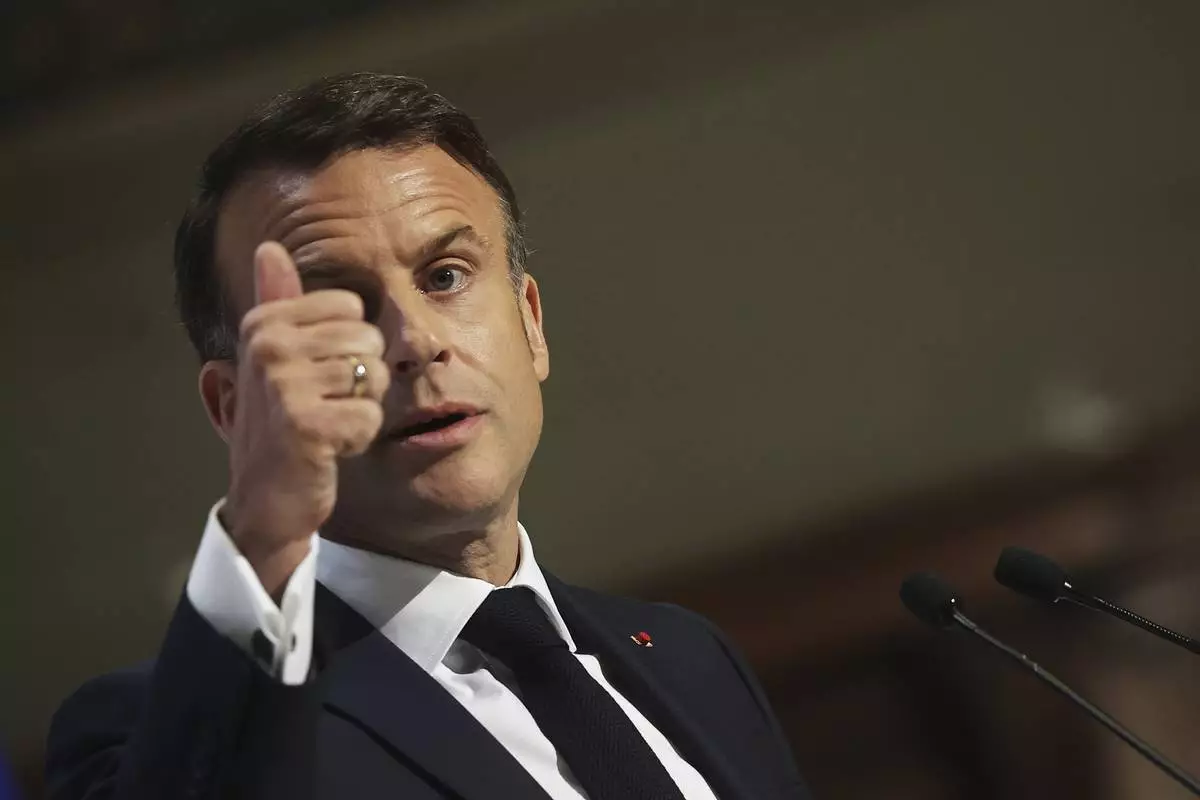
French President Emmanuel Macron delivers a speech on Europe in the amphitheater of the Sorbonne University, Thursday, April 25 in Paris. 2024. French President Emmanuel Macron will outline his vision for Europe as a more assertive global power at the backdrop of war in Ukraine, security, and economic challenges in a speech ahead of pivotal election for the European Parliament in June. (Christophe Petit Tesson, Pool via AP)
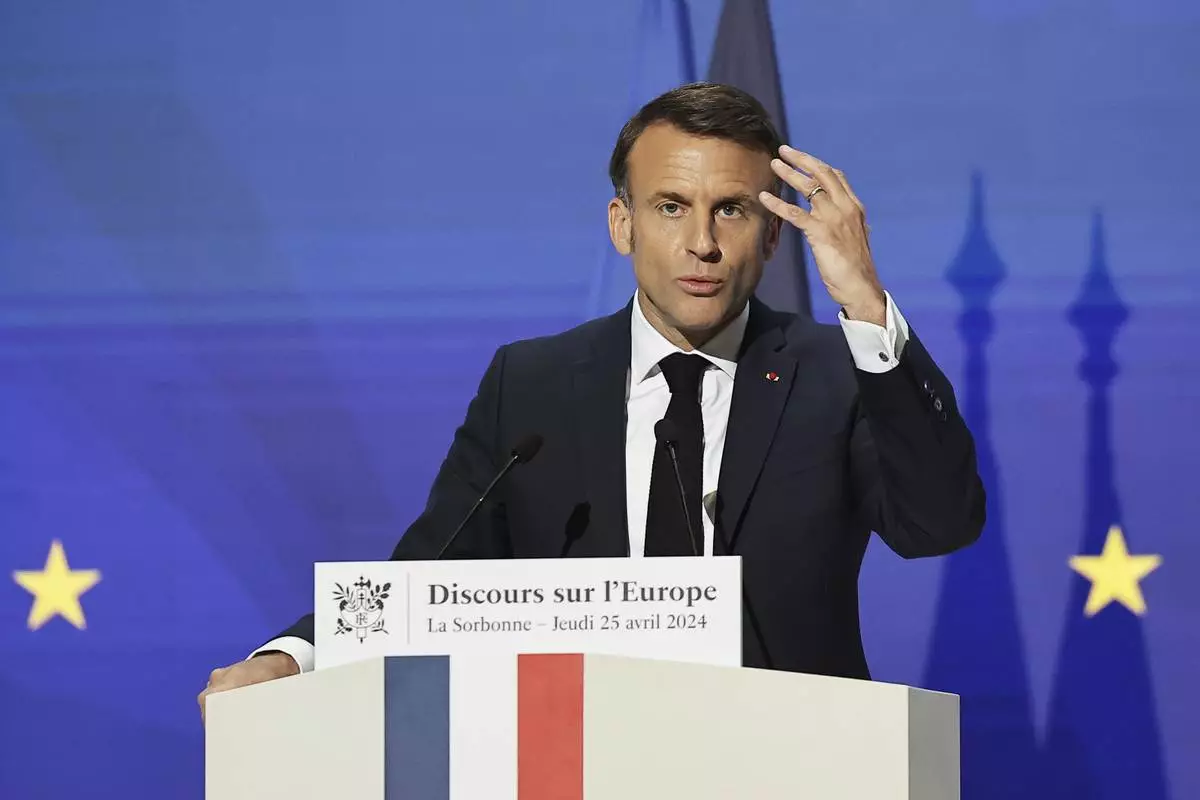
French President Emmanuel Macron delivers a speech on Europe in the amphitheater of the Sorbonne University, Thursday, April 25 in Paris. 2024. French President Emmanuel Macron will outline his vision for Europe as a more assertive global power at the backdrop of war in Ukraine, security, and economic challenges in a speech ahead of pivotal election for the European Parliament in June. (Christophe Petit Tesson, Pool via AP)
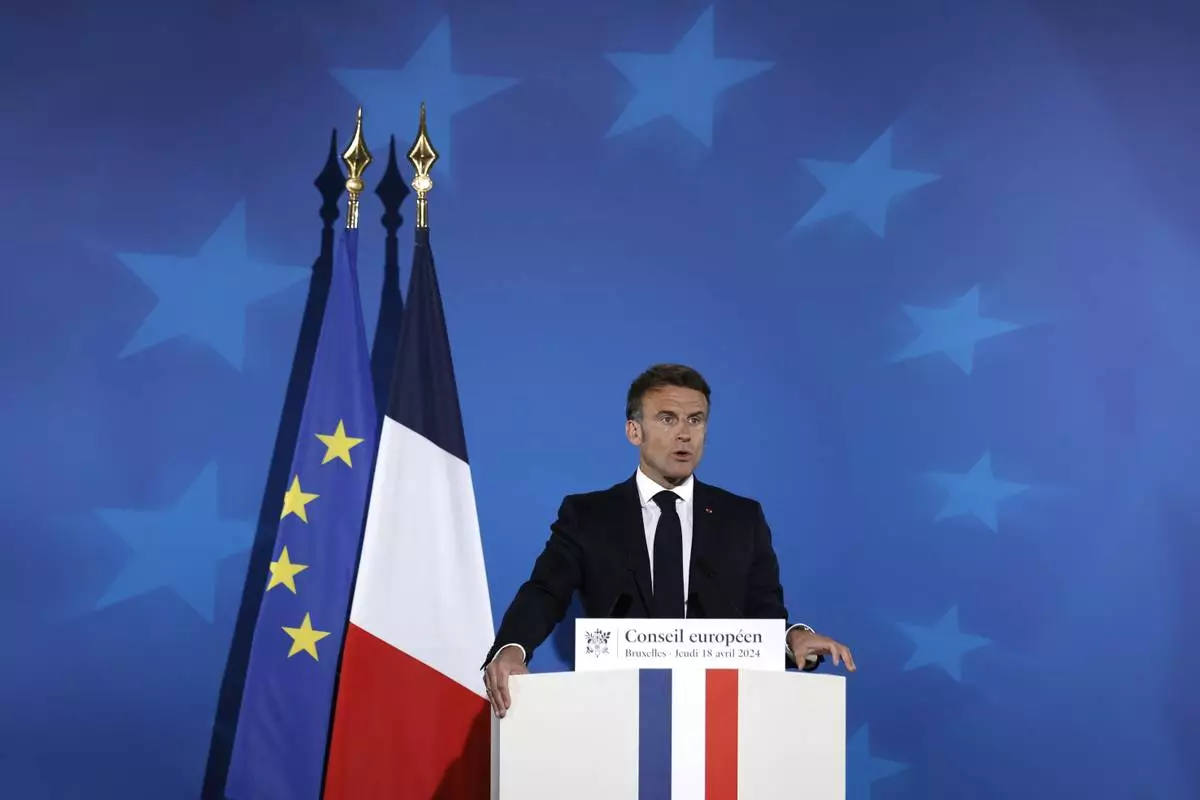
French President Emmanuel Macron speaks during a media conference at an EU summit in Brussels, Thursday, April 18, 2024. European Union leaders on Wednesday debated a new "European Competitiveness Deal" aimed at helping the 27-nation bloc close the gap with Chinese and American rivals amid fears the region's industries will otherwise be left behind for good. (AP Photo/Omar Havana)


























